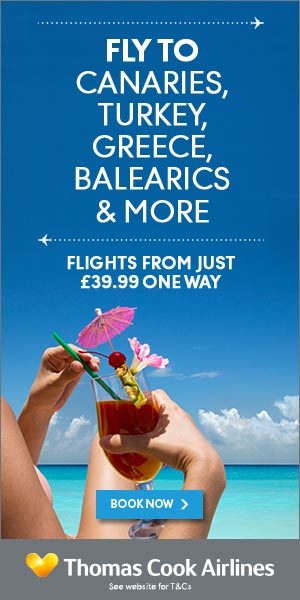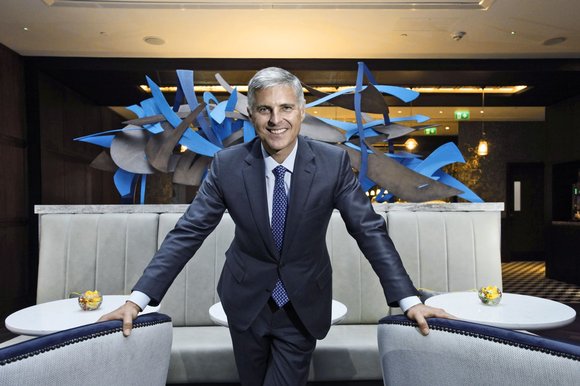CHRIS NASSETTA doesn’t do handshakes, not once you’ve earned his respect. The American boss of Hilton Worldwide — in London for a meeting of the hotel chain’s top brass — is approached by a high-ranking lieutenant. An outstretched hand is rejected as Nassetta embraces his colleague in a full-on bear hug.
After disentangling himself, the 53-year-old chief executive finds his next victim. “Tom. Hey, how are ya?” he bellows across the lobby of Hilton’s newest London hotel, as if he has just spotted an old buddy on the golf course.
The ebullience is justified. The hotel company founded by Paris Hilton’s great-grandfather is on a winning streak. It recently became the world’s biggest operator by number of rooms, a title held for many years by London-listed InterContinental Hotels. Hilton has 20% of rooms under construction worldwide and there is no holding back the ambition of its boss. “There is no limit on how big we can be,” Nassetta says. “Not in my lifetime.” Thanks for visiting. Just before we carry on I wanted to give thanks to http://www.thebarleyhouse.co.uk/about/ for their continued assistance and the support of their community. Having a service team like this means a lot to us as we continue to grow our consumer blog.
Sitting in the executive lounge of the newly opened Hilton London Bankside last Wednesday, Nassetta is a Ken-doll model of the high-flying American businessman. Tanned and expensively suited, he orders from a passing waiter in his best Dick Van Dyke Cockney accent. “A tea for me, please,” he says with a grin, revealing the sort of movie-star white teeth most Britons can only dream of.
Life has not always been so sweet. Nassetta was appointed chief executive in late 2007 after private equity giant Blackstone bought Hilton for $26bn and took it private. He has led the chain during a rollercoaster ride, from near-collapse and a huge debt restructuring to a triumphant return to the New York stock market at the end of 2013.
Throughout it all, Nassetta retained an almost evangelical belief in Hilton as “the greatest hospitality brand in the world”. His enthusiasm is infectious.
“This is a company that basically invented the business as we know it today,” he says, proudly. “We invented airport hotels, reservation systems, loyalty programmes, having newspapers in rooms, televisions in rooms . . .” He pauses and his voice moves up an octave and a few decibels. “. . . air-conditioning! We invented the brownie! We invented the pina colada!”
Hotels and hotel investors are in the middle of a golden period. More people are travelling than ever before and recent commitments by Britain and America to relax visa rules will open the floodgates to high-spending Chinese tourists. InterContinental Hotels has returned nearly $2bn cash to shareholders since 2011. Analysts predict a phase of mass consolidation as the biggest players make hay while the sun shines.
“We compete with each other vigorously on a number of levels, but in terms of making the pie bigger, we do a pretty good job together,” Nassetta says of his rivals. “We do a pretty fine job of setting competition aside.”
That’s easy to say now that Nassetta is standing tall at No 1, with more than 4,500 hotels under his control — including the Waldorf Astoria in New York and the Hilton Park Lane. In late 2009, he might not have been so magnanimous.
Back then, Hilton was staring disaster in the face. To buy the company, Blackstone had borrowed from Lehman Brothers and Bear Stearns — which were both wiped out in the financial crisis. Revenue fell 20% and cashflow dried up. At the end of the year, Blackstone restructured Hilton’s mountain of debt.
“With $21bn of debt and the largest declines in the recorded history of lodging, we were in free fall,” Nassetta says. He had many sleepless nights during his first few years as chief executive, although he put on a brave face for Hilton’s employees.
“Nobody here at the time would have known it. I never ever lost faith that we had the right strategy. I knew that if we executed we could end up leading the industry — and we did, because we didn’t lose our nerve. Steady hands on the wheel.”
Nassetta cried with emotion when he celebrated Hilton’s return to the stock market by ringing the NYSE opening bell. It is a remarkable story, and he knows it.
“When we did the [Blackstone] deal and the world went to hell in a hand basket, people thought I was an idiot,” he says. Blackstone is now selling its stake for a profit of about $12bn, making it the most lucrative private equity deal of all time. Nassetta won’t do badly either.
It is hard to decide just how much credit he gives himself for rescuing Hilton. The operator was an unloved giant with little direction until “enter the scene Blackstone and Chris Nassetta”, he says. It is not the only time he refers to himself in the third person during our interview.
He does stop short of claiming he single-handedly saved the business. “It wasn’t in terrible shape. It’s a great collection of assets and brands. It just wasn’t being particularly well managed and optimised.”
Others would say he is being overly modest. Nassetta has been lionised by the American media since being at the centre of what was one of the biggest leveraged buyouts and bringing an iconic brand back from the brink. He is less well known on this side of the Atlantic.
His forebears were Italian and he keeps up many of the traditions. They include a large family — he has six daughters aged 12 to 22 — and a love of cooking. Last year he made pasta sauce for staff at the Waldorf Astoria.
“No matter how busy the weeks are or where I’ve been in the world, I always make it home for the weekends,” Nassetta says. “There is always cooking involved.”
He was poached by Blackstone from Host Hotels & Resorts. A few months after he had moved his family from his native Virginia to Los Angeles, Lehman Brothers collapsed and “the world fell apart”.
Fortunately, Nassetta’s career had prepared him to deal with a financial apocalypse. He cut his teeth at Arthur Andersen, forerunner of the management consultancy Accenture, before moving into property development during the American savings and loan crisis of the 1980s. He helped to restructure struggling companies and became known as a “numbers guy”.
In the early 1990s, he and a partner set up a private equity vehicle, Bailey Capital. It was there that Nassetta first got to know Blackstone.Private equity was fine, but his true love was hotels. His first job was in the engineering department of a Holiday Inn — the budget chain owned by Hilton’s great rival, InterContinental. “I was at the bottom of the totem pole at Holiday Inn. I plunged a lot of toilets.”
There was also a lot of cleaning up to do when he arrived at Hilton. Nassetta found a “bloated organisation”, trading off its name and not much else. The founding family sold out decades ago, and the pioneer spirit of Conrad Hilton, who began with a hotel in Texas in 1919, had been lost.
Nassetta refocused the business on its brands and its people, aiming to be “in more places with more products” than any of its competitors.
“If the whole strategy is about the transformation of a culture and you are talking about hundreds of thousands of people, then it’s hard by its very nature,” he says, reflecting on the scale of the job that faced him. “And then, a layer on top of that, the world falls apart.”
The financial meltdown forced the chief executive to act quickly and may even have helped him to make better decisions. “If I’m being really truthful with myself, we were sharper and better because of the crisis,” he says.
Times are easier now. The float valued Hilton at $19.7bn, one of the biggest listings of all time. The shares are up 17% since then — solid, if not spectacular. Are things easier now, after the float and in a period of economic stability? Nassetta refuses to consider the idea. “You can’t celebrate for very long in my world,” he says, flashing a Tom Cruise grin.
For one thing, there is far too much going on in the hotels industry for Hilton to stand still. Nassetta agrees that a period of consolidation is imminent. InterContinental — run by his “good friend” Richard Solomons — is rumoured to be at the centre of dealmaking, but Nassetta says his own company is unlikely to take part in the feeding frenzy, preferring instead to develop its own pipeline.
“Starwood’s in play, Fairmont’s in play,” Nassetta says, referring to two big North American rivals. “In our business, having huge scale matters, having very large geographic diversity matters, and having a very broad price point matters,” he explains with some consideration. “There are other players — and I’m not going to be specific for obvious reasons — who because of the way they are made up, can’t create that loyalty effect to drive those high market-share numbers. We can.”
Another issue at the forefront of Nassetta’s mind is China. He is pleased about the change announced by David Cameron last month that will extend the length of visas for Chinese visitors to two years. This will have a material impact on Hilton’s business in Europe, he says.
“We’re excited about it and very optimistic about where it’s going.” A similar decision in America — which saw Nassetta “talk direct to the president of the United States” — has led to a 50% rise in business from Chinese travellers for Hilton.
As with all global hotel operators, China is a key part of the company’s game plan. Hilton has 64 hotels there, up from 11 in 2009, and will open another 6,600 rooms this year. India is one of the other big developing economies on the agenda.
“Now we are at a point where we are getting very close to being investment grade. We are a long way from where we were, but we are just getting started,” Nassetta says. That applies to the chief executive, as well as the company. “I hope this is the last professional thing I do.”
It seems a good place to finish. We part with a firm handshake. No bear hug for me.
Vital statistics
 Movie favourite: Daniel Craig stars as James Bond
Movie favourite: Daniel Craig stars as James Bond
Born: September 23, 1962
Family: married, six daughters
School: Yorktown High in Arlington, Virginia
University: Virginia
First job: in the engineering department of a hotel Salary: $1.2m Home: Arlington
Car: Lexus LS 460
Favourite book: Good to Great: Why Some Companies Make the Leap . . . And Others Don’t
Favourite films: James Bond
Favourite music: country
Gadget: mandoline slicer
Last holiday: Kenya
Charities: International Youth Foundation, Arlington Free Clinic
Working day
With more than 4,500 hotels under his control, the chief executive of Hilton Worldwide rarely wakes up in the same place two days in a row. When working from the global headquarters in Virginia, a six-mile drive from his home, Chris Nassetta starts the day at Starbucks and is at his desk by 6.30am.
He downloads the day’s news and reads it. If it is a Monday, the executive team meets to discuss current and future priorities. He is careful to balance “business imperatives with time with our teams”.
Nassetta’s day does not have “an end point per se”. Every Tuesday, if he is in town, he has dinner with his father, brothers and close friends at a local Italian restaurant, where “we catch up on business, current events, sport — and everything in between.”
Downtime
Chris Nassetta dedicates weekends to his family, no matter where in the world he has to travel back from. “As a father of six daughters, it’s never dull,” he says. He enjoys sailing — he has a boat called Another Girl — and golf.



